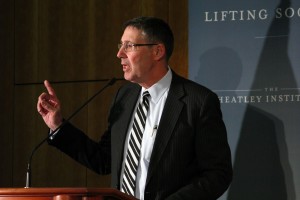
John Herbst served 31 years as a Foreign Service officer in the U.S. Department of State. He is a former U.S. Ambassador to both Ukraine and Uzbekistan and U.S. consul general in Jerusalem. He is the current director of the Dana Patriciu Eurasia Center at the Atlantic Council. He titled his address “The Ukraine Crisis and the Challenge of Kremlin Revisionism,” which is a serious problem in his opinion.
“Most of the information that you’ve been presented about this crisis has talked about it in the framework of a Russian-Ukraine problem,” Herbst said. “But I have some news for all of you. This is not principally a Russia-Ukraine problem. This is a Vladimir Putin problem.”
Russian President Vladimir Putin was elected in May of 2012 for the second time. Herbst said his first years “produced some order in Russia” as crime largely ended and as he introduced fiscal austerity and discipline. Russia grew stronger in the 2000s, but with the rise in “frozen conflicts,” Herbst argued, Putin now presents a threat not only in Eastern conflicts but around the world with his “kleptocratic, autocratic state.”
“The problem of a rogue president in control of one of the world’s two largest nuclear arsenals is easily the most important national security challenge that we face today,” Herbst said.
Herbst related a background of Russian history as a “prelude” to the crisis in Ukraine that began in November 2013 when then-president Viktor Yanukovych backed away from signing a trade association agreement with the European Union. The agreement was intended to ease customs barriers between the European Union and Ukraine. Ukrainian demonstrations in response to Yanukovych’s inaction spurred Russian aggression.
The aggressive Kremlin actions and Putin’s military force application to change borders was met without Ukrainian resistance until the election of a new president, Petro Poroshenko.
“As Mr. Putin developed his policy, he also developed a doctrine to justify these policies,” Herbst said. Putin was out to protect ethnic Russians and Russian speakers, according to Herbst. European nations sanctions were issued along with a cease fire, but Herbst believes the situation’s end is still far away. Kiev’s ambassador reported a Russian offensive bringing troops across the border just this week.
“The situation is more serious today than it was a few weeks ago,” Herbst said. “This crisis … however it turns out, is not the end of our Putin problems. Unless Ukraine will bust the Kremlin, succeeds in at least stopping any further Russian gains on its territory and begins to develop as a normal democracy and market economy … we will see Putin provocations in other countries.”
Herbst said the West is “only slowly” waking up to the Putin problem but that the Ukraine crisis requires awareness and action. “It all starts with a proper understanding of the problem,” he said. “We need to make Mr. Putin pay a very high price in Ukraine for his aggression.”
Herbst’s solution begins with providing weapons to Ukraine, rejecting the “short-sighted” policy in Washington that sending weapons will escalate conflict. “If you want this war to stop,” he said, “the best thing you could do is make it easier for Ukraine to protect its own soldiers and kill the enemy, kill the aggressor. … This is aggression, and you know, we did not fight Hitler with blankets.”
He argued that NATO must also “explicitly acknowledge” the policies needed to deal with Russia, “at best an opponent, at worst a serial aggressor.” Military assets must be provided in the Baltic states to dissuade aggression. The West should reach out to countries not a part of NATO to remain informed about developments.




